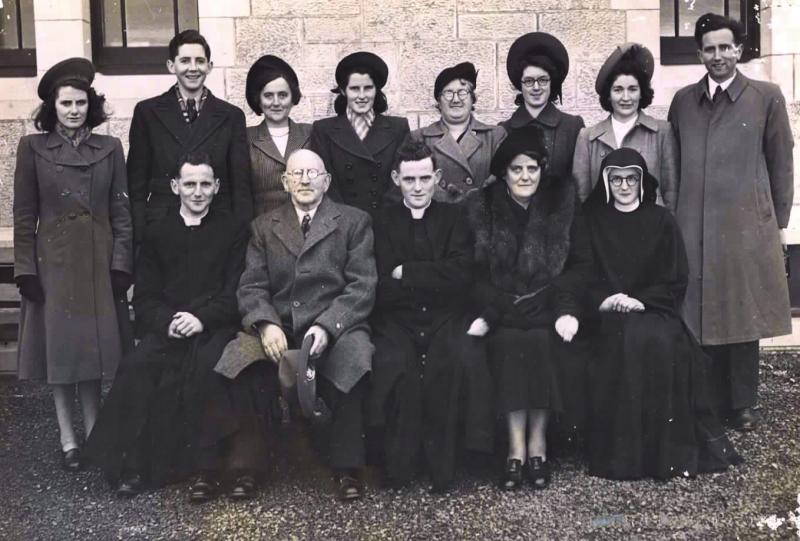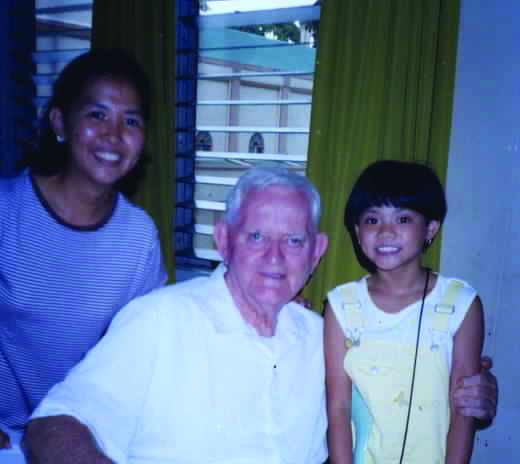Fifty Years And Going Strong
By Fr. Patrick Hurley MSSC
Why do I write on this topic? Because I was requested to do so by the good managers of Misyon magazine. I told them frankly that I could answer their request in a few lines. But they insisted it must be more than a “few lines” so I will try to expand the simple story of my missionary vocation to more than a few lines.

My parents were elementary teachers in a small faraway village in the southern part of Ireland. I was number three in a family of ten – seven boys and three girls. As there were no local high schools in that area, our parents had to sacrifice to send us all to boarding schools, about one hundred and forty kilometers from home. I had only two teachers in my elementary education – my mother and my father.
First vocation in the family
When the oldest boy, Dermot, graduated in high school, he decided to join the Columban missionary society which at that time was mostly preparing priests for the Chinese mission, to a country with few Christians and which had the biggest population in the world. Dermot was the oldest in a family of ten and a topnotcher in his class. My parents made no objection to his decision. He was ordained in 1944 and died in the Fiji mission in 1999.
My own, secret plan
When my graduation day came, my parents were anxious about my own plan. Various possibilities were mentioned – engineering, horticulture, etc. But I had already decided two years earlier, that I would follow my brother in China. But that was my secret till graduation time.
Naturally, most would say that I was following in the footsteps of my older brother in choosing the same religious missionary group. But actually, that was not the real basis of my vocation. Let me explain…
Conviction
In June 1940, when I was about midway in secondary education, an alumnus from our school, Fr. Jerry Piggot, who was already a Columban Father working in China, came to our school and gave us a talk on the mission, specially his own mission in China. He gave us the usual talk about life on the mission and about God’s plan, the mission of Christ and His instructions to His apostles to go and teach His message to all people. He mentioned the huge population in China, who never heard the Good News of Christ. He did not say it was an easy life. He even expressed the hardships and problems of a foreign missionary in China in the first half of the twentieth century. So, to make a long story short, I well remember saying to my friend that evening, “I am going to be a missionary inChina.”
I was followed in the Columban family by my younger brother and sister, Fr. Gerry and Sr. Catherine.
Missionary motive
I thank the late Fr. Jerry Piggot for my Columban missionary vocation. That seed was planted sixty-two years ago – June 1940. So, it was a sudden and definite decision. I believe I was following the steps of the Columban co-founder, Bishop Edward Galvin, who wrote to his mother before he left forChina and said, “I am leaving for China this morning. Oh, how I hate that name. But I am going for Christ’s sake and to save souls that are dearer to Him than the whole world.” So, like our founder, I still hold that “saving souls” is central to my vocation.
Instant call
Incidentally my older brother told me many years later, “I was praying in our small village church and a decision suddenly entered my mind which said, ‘I will enter the Dalgan Seminar of the Chinese missionary society’.” This was also an instant vocation call.
So, about forty of us, all high school graduates, entered the new (and beautiful) seminary in September 1942 and about twenty of us were ordained in December 21, 1948. Our class was divided by our superior general – nine to Japan and ten to the Philippines. A few did further studies.

Rerouting
You may ask, if I joined the Columban Fathers for China, how is it that I have been over fifty years in the Philippines and never saw China? The answer is simple and sad. After we were ordained and ready for the Chinese mission in 1949, the communist government in China closed its doors to all missionaries. All the older Columban missionaries there were expelled from China. Only our dead Columban brothers rest there now.
An interesting point is that though we were assigned to our mission in July 1949, the first available boat we could get was the following February 1950. Nearly all the boats and liners were resting at the bottom of the sea due to World War II. We eventually arrived in Manila in April 1950 after a thirty-day trip in a large cargo ship through the Pacific Ocean – San Francisco toManila.
Toothpick appointments
Another interesting point is that when we arrived in Manila, the local superior was absent and he told the bursar, Fr. Tom Connolly, to appoint us as follows: five to Mindanao and five would stay in Luzon. So Fr. Tom made his own plan for appointments. He got ten toothpicks, cut five in half and held the ten ends sticking out between his thumb and forefinger. “Now, boys,” he said. “Come and pull a toothpick – long ones go to Mindanao and half toothpicks stay in Luzon.” We all obeyed and no objections were raised to this unique way of making clerical appointments. Incidentally, and by coincidence, today, fifty-two years later, the five long toothpick men in Mindanao have passed on and the five short toothpick men are still alive.
Road to Negros
When the Columbans opened the new Philippine mission in Negros, three of the Luzon men were included in the pioneer group of ten priests, and that is how I came to Negros in 1950. So my vocation in Negros was only for about fifty-two years and I have been assigned in many parishes in this present Diocese of Kabankalan during those fifty-two years.
Basis for vocation
Talking about religious vocation, may I add here the following – when a person, male or female, comes to me to discuss their possible vocation to the religious life, I always explain to them that the basis for such a life is in the three vows – obedience, chastity and poverty. If they understand the meaning of these vows and are willing to follow same, I give them my blessing.
I will finish by thanking God, for calling me to this life.
